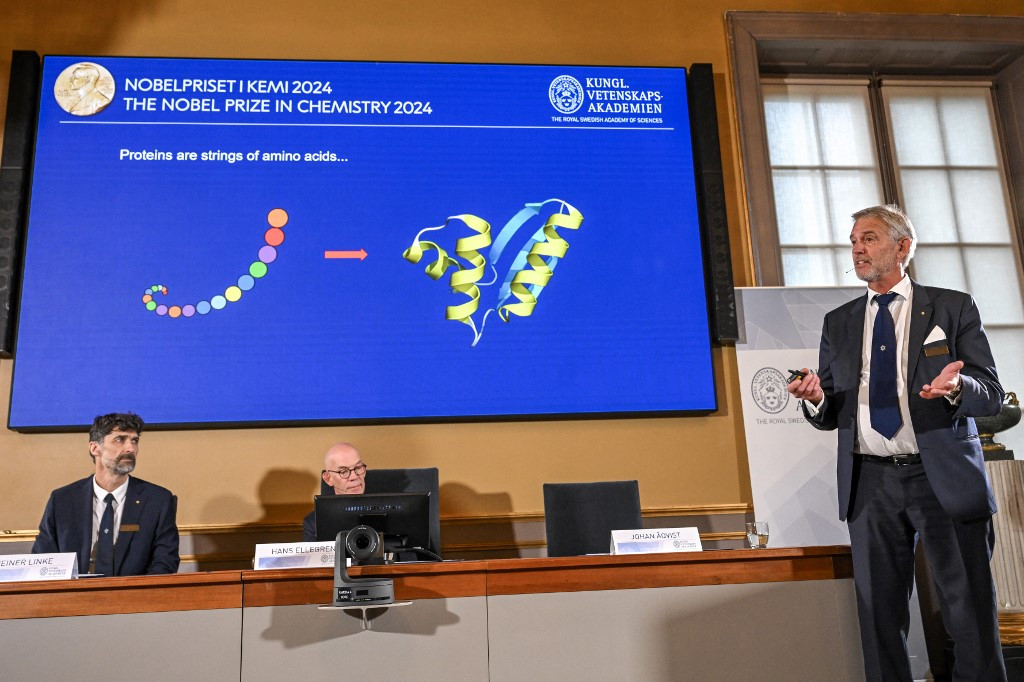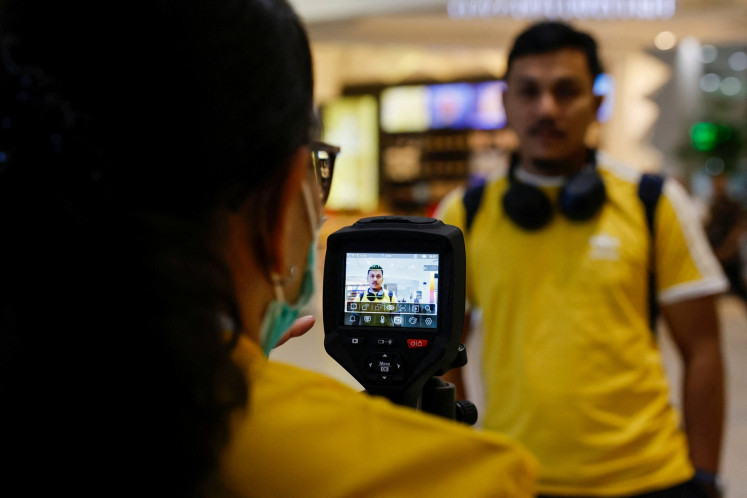Popular Reads
Top Results
Can't find what you're looking for?
View all search resultsPopular Reads
Top Results
Can't find what you're looking for?
View all search resultsTrio wins chemistry Nobel for protein design, prediction
Biochemist David Baker, 62, was given half the award "for computational protein design", while Demis Hassabis and John Jumper shared the other half "for protein structure prediction," the jury said.
Change text size
Gift Premium Articles
to Anyone
 (From left to right) Chair of the Nobel Prize Committee for Chemistry Heiner Linke and Secretary General of the Royal Swedish Academy of Sciences Hans Ellegren look on as Member of the Nobel Prize Committee for Chemistry Johan Aqvist speaks to the media during the announcement of the laureates of the 2024 Nobel Prize in Chemistry at the Royal Swedish Academy of Sciences in Stockholm, Sweden on Oct. 9, 2024. The Royal Swedish Academy of Sciences has decided to award the 2024 Nobel Prize in Chemistry with one half to David Baker “for computational protein design“ and the other half jointly to Demis Hassabis and John M. Jumper “for protein structure prediction.“ (AFP/Jonathan Nackstrand)
(From left to right) Chair of the Nobel Prize Committee for Chemistry Heiner Linke and Secretary General of the Royal Swedish Academy of Sciences Hans Ellegren look on as Member of the Nobel Prize Committee for Chemistry Johan Aqvist speaks to the media during the announcement of the laureates of the 2024 Nobel Prize in Chemistry at the Royal Swedish Academy of Sciences in Stockholm, Sweden on Oct. 9, 2024. The Royal Swedish Academy of Sciences has decided to award the 2024 Nobel Prize in Chemistry with one half to David Baker “for computational protein design“ and the other half jointly to Demis Hassabis and John M. Jumper “for protein structure prediction.“ (AFP/Jonathan Nackstrand)
A
mericans David Baker and John Jumper, together with Briton Demis Hassabis, shared the Nobel Prize in Chemistry on Wednesday for work revealing proteins' secrets through computing and artificial intelligence.
Biochemist Baker, 62, was given half the award "for computational protein design", while Hassabis and Jumper shared the other half "for protein structure prediction," the jury said.
"David Baker has succeeded with the almost impossible feat of building entirely new kinds of proteins," the Nobel committee said in a statement.
It added that his work has led to the creation of proteins that "can be used as pharmaceuticals, vaccines, nanomaterials and tiny sensors."
Hassabis and Jumper have developed "an AI model to solve a 50-year-old problem: predicting proteins' complex structures," the jury said of the duo who head up Google Deepmind.
Hassabis, 48, and Jumper, who was born in 1985, were among those speculated on as contenders for this year's Nobel for their work on the AI-model Alphafold. The AI tool is used to predict the three-dimensional structure of proteins based on their amino acid sequence.
The jury noted that the discoveries of this year's laureates "hold enormous potential."
Awarded since 1901, the Nobel Prizes honour those who have, in the words of prize creator and scientist Alfred Nobel, "conferred the greatest benefit on humankind".
Tuesday's physics prize also honored key breakthroughs in artificial intelligence (AI), going to American John Hopfield and Canadian-Brit Geoffrey Hinton, known as the Godfather of AI. On Monday, the Medicine Prize was awarded to American scientists Victor Ambros and Gary Ruvkun for their discovery of microRNA and its role in how genes are regulated.
The chemistry prize will be followed by the much-anticipated prizes for literature on Thursday and peace on Friday. The Economics Prize winds things up next Monday.
The winners will receive their prize, consisting of a diploma, a gold medal and a $1 million cheque, from King Carl XVI Gustaf in Stockholm on Dec. 10, the anniversary of the 1896 death of scientist Alfred Nobel who created the prizes in his will.










